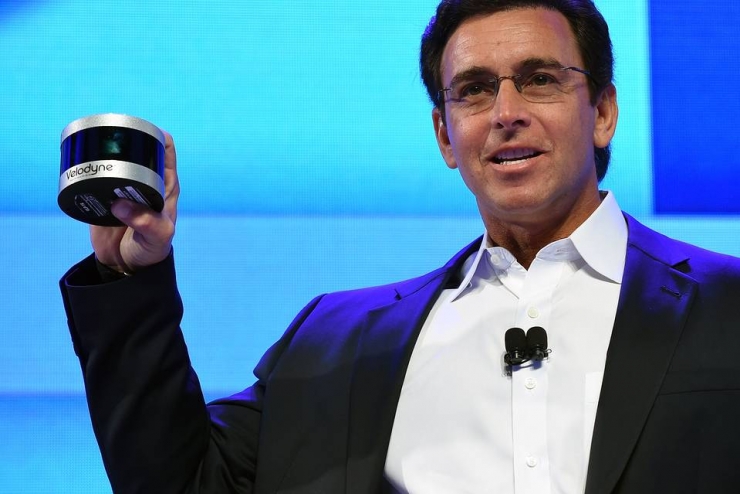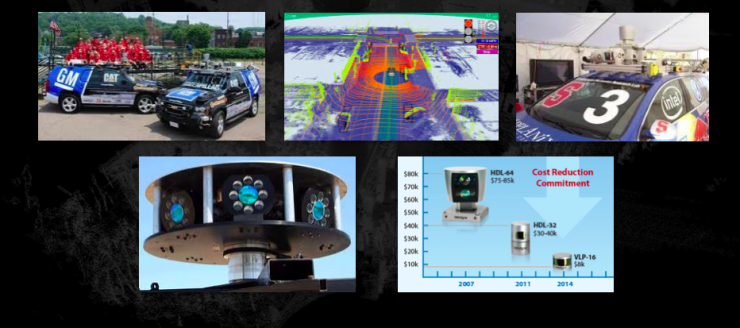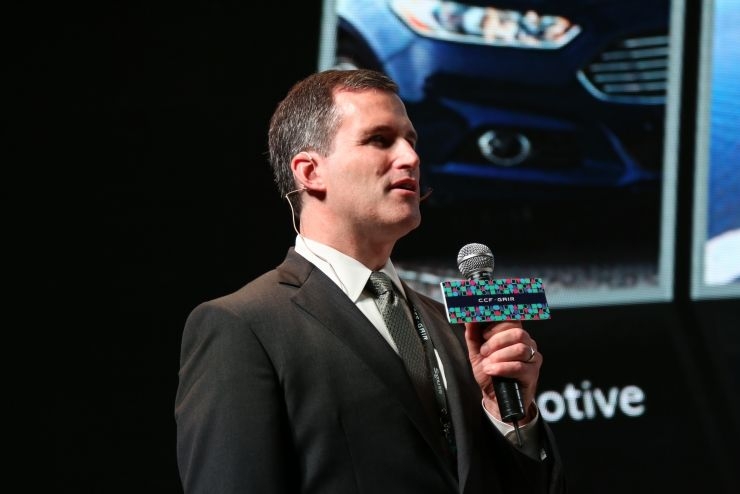
Picture from WSJ
The auto-pilot field has ushered in a major news.
On Tuesday, the laser radar vendor Velodyne announced that Veldarne’s lidar company, Lidar, had received a joint investment of 150 million U.S. dollars from Baidu. According to the Financial Times, Ford has invested 75 million U.S. dollars in Velodyne LiDAR, which means that Baidu may invest the same amount of funds in Velodyne LiDAR (Baidu did not confirm the news before the press release). Some commentators said that this is the latest action in a series of betting by auto makers and technology companies to promote autonomous driving.
David Hall, CEO and founder of Velodyne, said in a statement that the investment will help Velodyne reduce the cost of laser Sensors and accelerate the large-scale use of the technology in future cars.
The current price of laser radar is very expensive, and the current customization cost of laser sensors used by Google is around 80,000 US dollars. Exorbitant thresholds serve as a deterrent to large-scale production and commercialization of autonomous driving/unmanned vehicles. David Hall said that this situation will improve in the future. Ford and Baidu's investment will accelerate the reduction of production costs and realize the large-scale production of laser radar, which can be widely used in fully automated driving cars.
Velodyne's goal is to reduce the price of laser radar to between $300 and $500 to meet the Volkswagen market. Many industry analysts believe that laser radar is a key sensor for fully automated driving. Its products have been recognized by companies represented by Google and Baidu. They adopt a high starting point and high configuration in the R&D process to realize the reliability of the sensing system. Lidar provided an endorsement of trust.
Ford and Baidu invest in Velodyne
Founded in 1983, Velodyne is a Silicon Valley-based technology company that started out as a sound business and later expanded into Lidar. Velodyne’s influence in the unmanned field came from the 2007 DARPA Unmanned Vehicle Challenge. Carnegie Mellon University and Stanford University were the first and second place universities. They were using the Velodyne Lidar. Since then, the company’s developed laser radar has been widely used by companies involving unmanned companies such as Google and Baidu.
Why Ford and Baidu want to invest in Velodyne LiDAR, a person close to Velodyne told Lei Feng, because Velodyne is a private company, if car manufacturers in the future large-scale procurement of laser radar, worried that Velodyne in the development direction is not subject to change, " There is no way to control it, so car manufacturers require deep cooperation between the two parties. The premise is: Velodyne must give a third of the equity to the car company to invest .
It is understood that Ford and Baidu are the main investors, among which Velodyne gives a one-third valuation to investors, Ford and Baidu account for 70% of them, and the remaining 30% are investors of several strategic alliances with Velodyne.
According to the source, the negotiations between the parties have lasted for 8 to 10 months. "Under all three rounds, there was no success. Ultimately, the car companies accepted and accepted on very harsh conditions." The "Harsh conditions" are It means that investors such as Ford and Baidu have no power of control or seats on the board of directors, but they can first recommend the number of independent directors, "there is a nomination right, there is no final naming right."
According to public information, Velodyne's separation of its core business laser radar division this year, the original Velodyne Acoustics has now become Velodyne Holding (Velodyne Holdings), divided into three business directions, namely Velodyne Acoustics, Velodyne LiDAR and Velodyne Marine.
Velodyne LiDAR CEO Visits China
From August 12 to 13, Michael Jellen, CEO of Velodyne LiDAR, was invited to attend the Global Artificial Intelligence and Robotics Summit organized by the Chinese Computer Society and organized by Lei Feng. Wang Jin, senior vice president of Baidu, also attended the summit. Wang Jin complained to Michael Jellen at the conference: when Baidu purchased a laser radar from Velodyne, it cost RMB 700,000.
With regard to expensive prices, Jellen explained that the demand on the market is still very small. If there are millions of orders, you can give a discounted price, which is 500 dollars per unit.
After Jellen's speech was over, some media asked him if Velodyne had other investments. Jellen did not respond directly at the time, but said euphemistically: “Velodyne is a money-making company that can fund its own operations. But from the future development Look, we will make the right decision to use capital to expand the market.†From now on, this confirms that Velodyne did accept external investment.
According to Jellen, Velodyne's office in Beijing will be completed this fall. He said that considering the expansion of customers, it will also open offices outside Beijing. On the one hand, it provides automotive manufacturers with technical and service support, and at the same time facilitates consultation with Chinese factories to pave the way for mass production.
According to sources close to Velodyne, Baidu had purchased Veladone's multi-million-dollar laser radar. For Velodyne, it is clear that it is easier for a Chinese company to open up the domestic auto market for its own brands, which will play an exemplary role. For Baidu, it can also indirectly improve its influence in the driverless area.
In terms of market entry, Velodyne Lidar is not just aiming at a fully-autonomous driving car after 10 years. At this stage, it will develop Level 3 based assisted driving, which is also in line with the strategy and development rhythm of car manufacturers. Velodyne's current practice is to supply its products to vehicle manufacturers for testing and to formulate technical standards for laser radar products based on their feedback.
Wu Wei, Director of Velodyne LiDAR Asia Pacific, told Lei Fengwang (search for "Lei Feng Net" public concern) that the current Velodyne team has expanded almost twice and there are nearly 15 products on the line (including maps, autopilot and drone lidar) ). Among them, Velodyne's existing 3 products (64-wire, 32-wire, 16-wire) will undergo product iterations in 2019. Orders received before will be delivered in 2018 and 2019. In addition, Weng Wei revealed that Velodyne will also introduce chip-level products.
Three laser radar manufacturers have a backingAt present, the representatives of the global R&D laser radar include: Velodyne, Ibeo and Quanergy.
In addition to Ford and Baidu’s investment in Velodyne, in early August, ZF, the auto parts supply giant, announced that it had acquired a 40% stake in Ibeo, a laser radar company based in Hamburg, Germany. ZF’s equity acquisition aims to acquire Ibeo’s expertise in lidar technology and context-aware algorithms.
In addition, Quanergy received a strategic investment in auto parts giant Delphi in 2015. The latter acquired a partial stake in Quanergy. Currently, engineers from both companies are working hard to develop a laser radar system. In July of this year, Quanergy received a $100 million Series B round of financing.
As one of the most important sensors for autopilot, laser radar has long been the focus of attention in the industry. Major companies such as Google, BMW, Mercedes, Audi and Volvo, automotive suppliers such as Bosch, Delphi, Continental and Pioneer, as well as startups such as Cruise Automation, NuTonomy, etc., all use laser radar in their automated driving systems. Therefore, people in the industry have commented: Lidar is half of the auto-pilot.
The current problem with laser radar is its high cost and size. With the development of technology, as well as auto manufacturers and automotive suppliers have all invested in the company's Lidar company, there is no doubt that this will further reduce the cost of laser radar and accelerate the arrival of automatic driving.
Related reading: Behind the driverless car, the story of Velodyne
This article is a new intellectual article and welcomes attention to new intellectual driving. WeChat added "AI-Drive" or "New Driver" to subscribe to the public number.

7/8" series Connection Cable provides a wide range of metric for power supply .The ingress protection is available and rated to IP 67, these connectors are ideally suited for industrial control networks where small sensors are required. Connectors are either factory TPU over-molded or panel receptacles supplied with sold-cup for wire connecting or with PCB panel solder contacts. Field attachable / mountable connector is also available for your choice.
7/8" Bulkhead Connector,7/8" connector Cable,7/8" Power Connector cable,Power Connector male to female
Kunshan SVL Electric Co.,Ltd , https://www.svlelectric.com